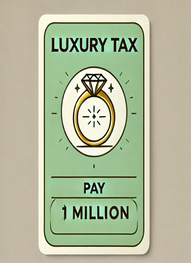Division 7A vs Family Court – an unholy alliance against your private company
Divorce is exhausting. Disentangling from your spouse’s financial affairs is traumatic. If you are lucky you grab your money and run. Unfortunately, that’s not the end of it. Div 7A divorce tax means more heartbreak for you.

Got tied down with the wrong person? Don’t get tied down with the tax.
Do you have a private company or trust? Under Div 7A Income Tax Assessment Act (1939) (ITAA39) you risk losing a part of what your spouse left you to tax.
Family Court overrides Stamp Duty
Often, when you transfer assets you pay 4.5% on stamp duty. However, if you want to escape stamp duty of a Div 7A divorce you need:
- a Binding Financial Agreement (BFA); or
- Consent Orders from the Family Court: s 113 Duties Act 2008 (WA).
Mums and Dads make BFAs anytime during their relationship. For example, a prenuptial agreement. A BFA regulates or controls how your finances are managed following the breakdown of your relationship. It limits the Family Court from meddling in your affairs.
Read more about BFAs.
/drafting-div-7a-loans-atos-4-concerns/
Family Court vs Capital Gains Tax (CGT)
Dad bought a property for $500K. Dad transfers the property to Mum. At the time of the transfer, the property is worth $1mil. This means Dad has made a capital gain of $500K. This capital gain forms part of Dad’s taxable income.
Alternatively, Mum bought a property worth $1.5mil. When she transferred it to Dad it was worth $1mil. Mum made a capital loss of $500K. Mum can’t claim the loss on her income. However, she can use the loss to reduce a capital gain in the same income year. If there is no capital gain to offset the loss, Mum can carry it forward to the next year.
GCT roll-over relief operates to defer a capital gain or loss until another CGT event occurs. It applies automatically where:
- Mum, Dad or Dad’s company is the transferor
- Mum or Dad is the transferee
- The transfer is done to satisfy a BFA
This means that any transfer between Mum, Dad or a Company under a BFA is exempt from Capital Gains Tax.
I have a BFA – Why am I being taxed?
You and your company are different entities. You have different tax obligations and tax rates. The company is charged a lower rate than your highest personal income marginal rate.
Therefore, for the high individual income earner, it makes sense for the company to make the income. The downside is that this wealth, this income, is now trapped in the company.
Removal of assets from the company
To get the assets out of the company Mum transfers them to herself. This has dreadful tax consequences. The law states that money removed from a company is a dividend: s 44 ITAA36. A dividend is taxed at your personal income marginal tax rate. Therefore, you need to pay a top-up divorce tax. This is as high as 17%.
To get around paying the top-up tax Dad borrows money from the company. Dad wants a new TV. He uses the company credit card. Then he never pays the money back. This was under s 108 Income Tax Assessment Act 1936 (Cth) (ITAA36).
The Government was fed up with Dad not paying the correct tax. They introduced Div 7A. Now, Divorce and Div 7A operate to stop Dad from freely taking money out of the company without paying the top-up tax.If Dad wants to borrow money, he needs a Div 7A complying loan deed. This requires him to pay 1/7 of the total each year, as well as a minimum interest set by the government.
Now, Dad can’t borrow the company’s money and not pay it back. If he does he’ll have to pay the penalty top-up tax. Alternatively, Dad takes out a Div 7A complying Loan Deed. Dad no longer pays the top-up tax. However, he needs to pay 1/7 of the loan each year, as well as interest set by the Government.
Start building your Div 7A complying Loan Deed today.
What if the receiver isn’t Dad but the ex-wife?
The Government has thought about this. To satisfy the BFA a company transfers assets to Dad’s ex-wife. This is still considered a dividend under Div 7A. Dad’s ex-wife is an ‘associate’. The term associate includes Dad’s relatives. For example, a current or former spouse.

Don’t take your chances with a Div 7A divorce tax
Why be afraid of the Div 7A divorce tax?
A Division 7A divorce means that any benefit Mum or Dad receives from the company is subjected to their personal income marginal tax rates. You now pay the difference between the company’s lower tax rate and your higher personal tax rate. This top-up tax is 17%.
In the divorce, Mum took Dad for all he’s worth. All that he’s left with is a $750K payoff from Mum’s private company.
When the money comes through Dad is dismayed to realise he pays another 17% to tax. That means he loses $127.5K. His $750 settlement is now only $622.5K cash in hand. Mum’s already laughing about it with her girlfriends.
Here’s how you can escape the trauma of Div 7A divorce tax
Even after your divorce, your wife is losing you money:
Sarah is married to a Dentist. While the Dentist is busy working, Sarah’s living the high life. His bank accounts foot the bill.
Sarah’s Dad helped her start a private company called ‘Socialites Pty Ltd’. She doesn’t touch a cent of its profit. She doesn’t need to with the Dentist around. Socialites Pty Ltd owns property worth $8.2mil. It has a debt of $2.2mil against it.
The Dentist is sick and tired of Sarah using him for his money. They get divorced. They consult their lawyers and make a BFA. Socialites Pty Ltd transfers the Dentist the property as well as the debt.
Does this trigger Div 7A divorce tax?
- The transfer of the property constitutes a ‘payment’ under Div 7A. the Dentist is deemed to have received a dividend.
- This occurs at the end of the financial year (30 June)
- The dividend is $8.2mil – $2.2mil (debt) = $6mil

- The Dentist includes a $6mil dividend in his assessable income for the financial year.
- Let’s say the Dentist’s personal income tax rate is 17% higher than the company tax rate. The Dentist pays $1.02mil to tax.
What about the Capital Gain?
- When Socialites Pty Ltd owns the property, it is worth $8.2mil.
- To satisfy the BFA the company transfers the property to the Dentist
- The Dentist received the property and its $2.2mil debt.
- The property’s cost base in the hands of Socialites Pty Ltd was $6mil ($8.2mil minus the $2.2mil).
- By transferring the property, they have made a capital gain of $2.2mil.
- CGT roll-over relief automatically applies. The company disregards the $2.2mil capital gain
He got the company, you got the tax:
Sarah’s sister Linda isn’t doing as well as her. Linda and her Dad never got along. She works hard for her money.
Linda and her husband Michael started a private company called ‘Frosted Pty Ltd’. Michael is a lying cheat. He’s been having affairs with the company’s clients. Michael wasn’t smart. Linda finds the text messages on their company mobile.
Linda doesn’t want a thing to do with the company. She owns 5 shares and Michael owns 15 shares. She agrees to transfer her shares to Michael. In exchange, Frosted Pty Ltd pays her $1mil.
/div-7a-where-the-borrower-is-a-family-trust/
Does this trigger a Div 7A divorce tax?
- Under Div 7A, the payment is a dividend
- Linda must include a $1mil dividend in her assessable income
- Let’s say Linda’s top-up tax rate is 17%. Linda pays $170K to tax. Now, Linda only has $830K cash in hand
- Michael gets the company
Does a Div 7A comply loan deed help?
Linda tells Michael she won’t transfer the shares. She doesn’t want to lose 17% of the payment. Michael agrees to pay her the money. He doesn’t have that sort of money on hand. He decides to borrow the money from the company under a Div 7A complying Loan Deed.
- Michael completes the Div 7A complying Loan Deed
- Linda transfers the shares to Michael
- Michael has borrowed the $1mil from the company to pay Linda
- The money is no longer coming from the company. It is coming from Michael. There is no top-up tax for Linda to pay.
- Michael pays 1/7 of the loan each year as well as interest.
- Because the loan was for buying shares, the interest is deductible.
- Michael and Linda both escape paying the top-up tax.
Start building your Div 7A complying Loan Deed on our website today.
I can’t stand my husband for another minute – should I just accept the Div 7A divorce tax?
A Div 7A divorce property settlement is difficult. It’s hard enough navigating a divorce without worrying about the tax. Sometimes, Dad won’t get a loan just to make your life difficult. You know that your personal income tax rate is 17% lower than the company’s tax rate. Do you just accept paying the top-up tax?
Make your BFA alter your settlement to reflect the tax you pay. Even the Family Court is required to consider the taxation effect on each party: s90AE(4) Family Law Act 1975 (Cth). Now, you no longer get 17% less than your entitlement. Instead, both Mum and Dad shoulder the burden together.
Division 7A vs Family Court settlements
As you can see from above we are all scared of Division 7A, well, at least have a healthy respect. The tax legislation is complex. A Pty Ltd (private company) and family businesses are a nightmare when it comes to Div 7A and divorce.
In the heat of the divorce, the Division 7A ‘loan’ is often non-complying. The result? The ‘loan’ or ‘payment’ from the private company to a shareholder (or their associate) is treated as an ‘unfranked dividend’. This causes an excessive tax burden on either divorcing mum or dad.
Division 7A vs family business vs family court
Partnerships, Unit Trusts, Family Trusts and companies are riddled with interconnected and ‘friendly loans‘. Such is the nature of a family group. Division 7A always lurks as a problem. But more so when you add a divorce, or two, into the mix.
Having a written Div7A Loan deed may not be enough.
With the help of your accountant, a Division 7A loan can help to purchase investments. This is a great use of lazy cash.
Division 7A and the family business when adding a divorce into the mix
You and your accountant plot and plan and carefully structure your family empire over decades. But a divorce immediately injects an all-seeing enemy into the structure.
Further, the delicate nature of a Div 7A structure is often sorely tested.
The Family Court often directs the movement of wealth without understanding that, while CGT and stamp duty, is avoided, Div 7A loans override the Family Court.
The otherwise all-powerful Family Court is sadly often unaware it needs to play second fiddle to Division 7A.
Example of a Division 7A nightmare for a private company
Dad’s holding company ‘beneficially’ owns shares in a bucket company:
- The holding company, in its own right, is the sole shareholder of the bucket company.
- To labour the point, the holding company owns 100% of the shares in the bucket company ‘absolutely’.
- The bucket company is a 100% subsidiary of the holding company. The company is the ‘ultimate holding company’.
The bucket company, over time, purchases an ASX share portfolio. This is for $2m. The cost base for the bucket company is, therefore, $2m.
Mum and dad divorce.
Dad is ordered, by the Family Court, to transfer the shares, from the holding company to mum. The holding company transfer its share in the bucket company to mum.
The market value the shares, at that time, is now worth $5m.
The share capital of the bucket company is the usual10 shares at $1 each. The paid-up share capital is, therefore, $10 plus the purchase price of the shares (being $2m).
From a CGT perspective, the $3m of capital gain (minus $10) is merely ‘rolled over’. This means that no CGT is payable by dad when he transfers the shares to mum. However, the capital gains tax liability has not disappeared. Rather, the capital gains remain ‘pregnant’. When and if mum sells the shares she will, at that time, suffer the CGT.
However, forget about CGT. This is an article on Division 7A. The transfer results in a deemed unfranked dividend assessable to Mum.
There are alternatives. This is the value of getting your accountant involved in the divorce proceedings.
Perhaps dad should have transferred the shares in the holding company to mum. And left the holding company still owning the bucket company shares. But, therefore:
- mum inherits dad’s cost base of the share capital. She has a massive future capital gain; and
- franking credits available to mum are limited. The balance of any capital proceeds has been paid by way of unfranked dividends.
Article authored by Adj Professor Brett Davies, Partner, Legal Consolidated and Ebony Deacon, JD Law Student, UWA
For more information telephone us.
Adj Professor, Dr Brett Davies, CTA, AIAMA, BJuris, LLB, Dip Ed, BArts(Hons), LLM, MBA, SJD
Legal Consolidated Barristers and Solicitors
Australia-wide law firm
After hours: 0477 796 959
National: 1800 141 612
Email: brett@legalconsolidated.com
See also:

